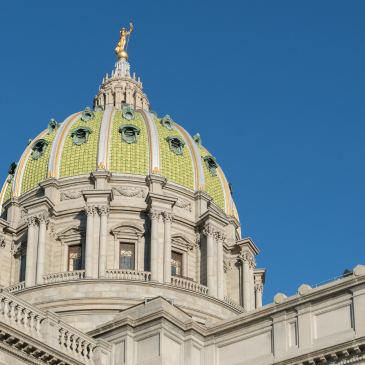
The Pennsylvania House of Representatives and Senate returned to session last week, reviewing several proposals related to the state budget, workers’ compensation, construction projects, unemployment benefits for striking workers, and more.
Here is a breakdown of what happened last week in the legislature of relevance to the business community.
Medicare/Hospital Subsidies (H.B. 1351)
On Wednesday, the House overwhelmingly approved House Bill 1351, budget-related legislation that directs critical funding toward the state’s emergency management services, hospitals, and nursing homes. The bill’s passage marks further progress in the ongoing effort to address various code bills that remained unresolved despite the passage of the main state budget bill earlier this summer.
Key provisions include the reauthorization of hospital assessments which are expected to leverage approximately $1.4 billion in federal Medicaid funding this year. This sum will then be reallocated to benefit hospitals attending to higher proportions of Medicaid recipients. The bill also allocates an additional $126 million annually in federal and state aid for Medicaid reimbursements to ambulance services for both ground and air transportation.
Under this legislation, the Commonwealth will now reimburse emergency medical service providers for every mile traveled with a Medicaid-covered patient, in contrast to the previous threshold of 20 miles.
Furthermore, the bill addresses Medicaid reimbursement rates for nursing homes, a crucial legislative fix sought to stabilize rates amid concerns that new state-set rates could jeopardize some facilities’ viability. Nursing home advocates warned of potential closures if these rates were left unaddressed.
This legislation previously passed the Senate unanimously, and it cleared the House by a vote of 199-4.
Workers’ Compensation Expansion (H.B. 1632)
House Bill 1632 would dramatically expand eligibility for workers’ compensation wage and medical benefits for various categories of employees diagnosed with mental health conditions.
Under current law, mental health conditions are generally compensable for workers’ compensation medical and wage-loss benefits if they are related to a physical injury or the result of an incident outside of the normal scope of employment. Otherwise, mental healthcare costs are generally covered by regular health insurance.
This legislation – which is intended to cover emergency response personnel but may be interpreted to include certain private sector employees as well – would trigger eligibility for workers’ compensation without safeguards to avoid misuse, which could increase costs significantly and incentivize plaintiffs’ attorneys to file unwarranted claims.
While we urged lawmakers to hold off on considering this legislation (CLICK HERE for our memo), the House Veterans Affairs and Emergency Preparedness Committee’s Subcommittee on Security and Emergency Response ultimately voted to refer the bill to the full Committee for consideration. The PA Chamber is engaged in discussions with lawmakers and bill supporters in an attempt to develop a compromise.
Criminal Penalties on Employers (H.B. 1751)
House Bill 1751 proposes several changes to the Construction Workplace Misclassification Act.
The changes proposed in this bill include severe penalties against employers for violations of this notoriously vague and complicated law, the threat of permanent debarment from Commonwealth contracting opportunities, and new opportunities for trial lawyers to sue construction companies.
An amendment filed by Rep. Dawn Keefer (R-York) sought to modify the definition of “debarment” and lessen these penalties, though the motion was defeated along party lines. We opposed this legislation (CLICK HERE for our memo), which passed the House Labor and Industry Committee by a vote of 14-11.
Public Utility Construction Projects (H.B. 1465)
House Bill 1465 proposes significant changes to the rules regulating a broad scope of public utility construction projects, which includes subjecting these projects to the PA Prevailing Wage Act.
The legislation would likely make projects more expensive and complicated to complete and public utility companies warn that higher costs will ultimately be paid by utility customers. If higher costs become prohibitive, it may force important projects to be delayed, scaled back, or canceled altogether.
We opposed this legislation (CLICK HERE for our memo) and argued it is not clear what H.B. 1465 would accomplish besides making these projects more complicated to complete, increasing costs on Pennsylvanians, and likely subjecting these Pennsylvania employers to frivolous lawsuits. The bill passed the House last Wednesday by a vote of 131-72. It now awaits action in the Senate Consumer Protection and Professional Licensure Committee.
Statewide “Responsible Contractors” (H.B. 1449)
House Bill 1449 would establish a so-called “Responsible Contractor” law to impose strict requirements on Pennsylvania companies contracted for state public works projects.
In reality, this legislation would disqualify a majority of Pennsylvania contractors from performing state work, which could be devastating for many companies with long stellar records of delivering projects safely, on time, and on budget. Additionally, project costs are certain to increase as the number of contractors able to bid on projects is narrowed, leading to higher costs for the Commonwealth and its taxpayers.
This legislation benefits a handful of companies at the expense of many others and Pennsylvania taxpayers. Accordingly, we opposed this legislation (CLICK HERE for our memo), which passed the House last Wednesday in a vote of 134-39. It now awaits action in the Senate State Government Committee.
Unemployment for Striking Workers (H.B. 1481)
House Bill 1481 would reverse nearly 90 years of national and state precedent by providing that individuals who voluntarily go on strike are eligible for unemployment compensation (UC) benefits.
This proposal detrimentally impacts employers and the economy in several ways, including by unfairly tilting the playing field in the event of a labor dispute; increasing UC tax rate hikes for employers experiencing a strike; and exacerbating the current insolvency of the UC trust fund.
Only two states currently allow striking workers to collect unemployment; and California’s Democratic governor, Gavin Newsom, recently vetoed similar legislation. We opposed this legislation (CLICK HERE for our memo), which passed the House Labor and Industry Committee in a partisan vote of 14-11.